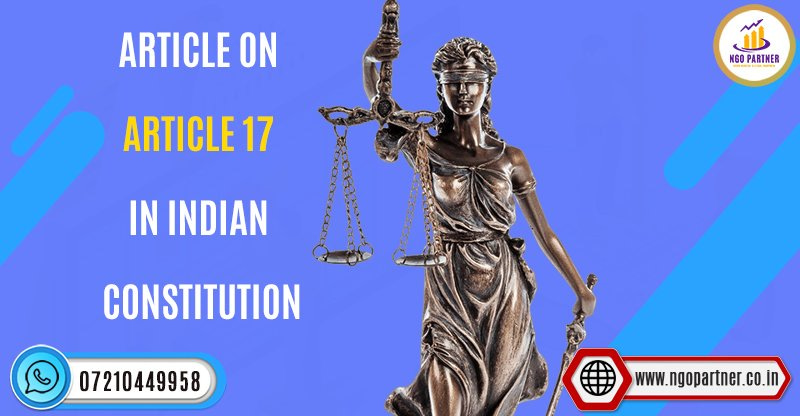
- June 13, 2023
- NGO Partner
- 0 Comments
- 800 Views
- 0 Likes
- Marketing Company Blogs
Article 17 in Indian Constitution
Article 17 in Constitution of India
Untouchability, a social evil deeply rooted in India’s history, has inflicted pain and injustice upon marginalized communities for centuries. However, the Indian Constitution stands tall as a beacon of hope, promising equality, dignity, and justice for all. At the heart of this commitment lies Article 17, a powerful provision that strikes at the very core of untouchability, aiming to eradicate it from society and build a more inclusive nation.

Article 17 of the Indian Constitution holds immense significance in its resolute stance against untouchability, declaring it illegal and ensuring its enforcement by law. This provision reflects the visionary foresight of our Constitution-makers, who recognized that a truly democratic and egalitarian society can only be built upon the principles of social equality and dignity for every citizen.
In this blog, we delve into the depths of Article 17, exploring its provisions, scope, and impact on eradicating untouchability. We also examine the challenges faced in its implementation and the progress made in breaking the shackles of this oppressive practice. Join us on this enlightening journey as we unravel the transformative power of Article 17 and its role in shaping a society where every individual is treated with respect, irrespective of their caste or social status.
Understanding Article 17 of the Indian Constitution
Article 17 of the Indian Constitution is a profound provision that aims to eliminate the practice of untouchability, which has plagued Indian society for centuries. This provision categorically declares untouchability as illegal and provides a legal framework for its enforcement. By recognizing the historical context and societal impact of untouchability, Article 17 acknowledges the need for a transformative change to establish a society based on equality and dignity for all.
Article 17 stands as a powerful statement against the discriminatory practice of untouchability, which perpetuates social hierarchies and denies basic human rights to individuals belonging to certain castes or communities. Its objective is to break the chains of this oppressive practice and ensure that every individual is treated with respect and equality.
Prohibition of Untouchability
Article 17 goes beyond mere declaration and enforces the prohibition of untouchability through legal means. It holds significant legal implications for individuals engaging in or promoting untouchability. Any act of untouchability, whether direct or indirect, is punishable under the law, and offenders can face legal consequences.
The scope of Article 17 extends to various aspects of social life, including access to public places, educational institutions, temples, wells, and other communal resources. It seeks to dismantle the barriers created by untouchability and establish a society where every individual has equal rights and opportunities, regardless of their caste or social status.
By declaring untouchability illegal and imposing penalties for its practice, Article 17 sends a clear message that discrimination based on caste is unacceptable and undermines the principles of equality and social justice. It serves as a crucial tool for social transformation and acts as a deterrent against perpetuating this discriminatory practice.
Enforcement and Implementation
To ensure the effective enforcement and implementation of Article 17, the Indian government has put in place various measures and mechanisms. Law enforcement agencies play a crucial role in investigating and addressing complaints related to untouchability. The judicial system plays its part by adjudicating cases and delivering justice to victims of untouchability.
Additionally, social awareness plays a significant role in combating untouchability. Awareness campaigns and educational initiatives are essential to sensitize individuals and communities about the importance of equality and dignity for all. NGOs, civil society organizations, and activists actively work towards promoting awareness and fostering social reform.
Challenges and Progress
Despite the legal provisions and efforts made, challenges persist in eradicating untouchability. Deep-rooted social beliefs, prejudices, and ingrained practices make it a complex issue to tackle. The hierarchical nature of caste systems continues to pose obstacles to achieving equality and social justice.
However, there have been notable progress and successes in eliminating untouchability. Movements such as social reform movements led by social activists and organizations have played a pivotal role in raising awareness and challenging discriminatory practices. The implementation of affirmative action policies, reservation systems, and efforts to uplift marginalized communities have contributed to reducing the prevalence of untouchability.
Role of Education and Awareness
Education and awareness play a vital role in transforming mindsets and creating a more inclusive society. By imparting knowledge about the principles of equality, dignity, and human rights, education equips individuals to challenge discriminatory practices and promotes a more egalitarian outlook.
Awareness campaigns, both at the grassroots and national level, are crucial in sensitizing people about the harms of untouchability and fostering a collective effort towards its eradication. By engaging individuals, communities, and institutions, these campaigns aim to change societal norms and promote inclusivity.
In conclusion, Article 17 of the Indian Constitution stands as a powerful tool in the fight against untouchability and the promotion of social harmony. It declares untouchability as illegal and ensures that it is enforceable by law. Throughout this blog post, we have explored the provisions, implications, and challenges associated with Article 17.
The significance of Article 17 cannot be overstated. It reflects the commitment of the Indian Constitution to eliminate discrimination and promote equality for all citizens. It serves as a beacon of hope, inspiring us to work towards creating an inclusive society that upholds the values of equality and dignity.
As readers, we have a vital role to play. Let us actively participate in creating awareness, challenging discriminatory practices, and fostering social harmony. By embracing the principles enshrined in Article 17, we can contribute to a society where untouchability becomes a thing of the past, and every individual is treated with respect and dignity. Together, let us build a future where equality reigns supreme.
Related: Article 15 of the Indian Constitution
Article 17 of the Indian Constitution outlaws “untouchability,” a discriminatory practice denying basic rights. It promotes social justice and equality, dismantling a system that oppressed a large part of Indian society.
The Constitution of India doesn’t have chapters, but Part 17. It deals with official languages used by the Union, states, judiciary, and for inter-governmental communication.
Article 17 of the Indian Constitution remains in effect. It hasn’t been repealed or amended. It continues to be a vital tool for fighting untouchability and promoting equality.




Leave a Comment